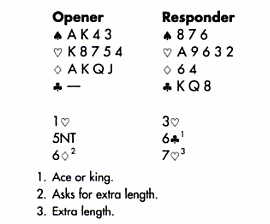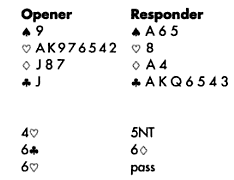Bridge Conventions in Depth By Matthew Granovetter, Pamela Granovetter
One of Ely Culbertson’s contributions to bidding theory, the 5NT Grand Slam Force, was originally named ‘Josephine’ by him, after his wife and favorite bridge partner. Once a trump suit has been agreed, either specifically or by implication, jumping to 5NT asks partner to bid seven with two of the top three trump honors. This is the traditional meaning. Most partnerships also agree on some meaning for a suit response at the six-level below the trump suit.

1: limit raise
6![]() : A or K of clubs
: A or K of clubs
6![]() : queen of trumps or extra length
: queen of trumps or extra length
So in our example auction:
with ![]() A x x x or
A x x x or ![]() K x x x responder bids 6
K x x x responder bids 6![]()
with ![]() Q x x x or
Q x x x or ![]() x x x x x responder bids 6
x x x x x responder bids 6![]()
with ![]() A K x x or
A K x x or ![]() A Q x x or
A Q x x or ![]() K Q x x responder bids 7
K Q x x responder bids 7![]()
Over a 6![]() response you can bid 6
response you can bid 6![]() to ask for extra trump length, for example:
to ask for extra trump length, for example:

Using 5NT as a trump Asking Bid
The 5NT Grand Slam Force can be used in a modified form when partner shows a long and strong suit. Here, the Grand Slam Force does not ask for two of the top three honors, but, rather, for solidity.

In general, a jump to seven now shows a suit that will run even opposite a void, like ![]() AKQJ7642. But what about bids at the six-level? Responses of 6
AKQJ7642. But what about bids at the six-level? Responses of 6![]() and 6
and 6![]() can be used to show hands that cannot play seven opposite a void, but can play opposite a singleton, doubleton, or tripleton, i.e.:
can be used to show hands that cannot play seven opposite a void, but can play opposite a singleton, doubleton, or tripleton, i.e.:

6![]() shows a solid suit opposite either a singleton or a doubleton; now the 5NT bidder bids 7
shows a solid suit opposite either a singleton or a doubleton; now the 5NT bidder bids 7![]() with a doubleton, or 6
with a doubleton, or 6![]() cwith a singleton; with a void he signs off in 6
cwith a singleton; with a void he signs off in 6![]() .
.

1. I have a singleton heart
With ![]() AK76432, West signs of in six hearts. With
AK76432, West signs of in six hearts. With ![]() AKQ7643, he bids seven.
AKQ7643, he bids seven.
Here’s an example hand:
Here 6![]() said West was (probably) solid opposite either a singleton or doubleton trump. with only a singleton heart, East bids 6
said West was (probably) solid opposite either a singleton or doubleton trump. with only a singleton heart, East bids 6![]() and West signs off. The other possible six-level response to 5NT is 6
and West signs off. The other possible six-level response to 5NT is 6![]() :
:
![]()
6![]() says that opener’s suit is (probably) solid only opposite the queen, or three small trumps. Here’s an example of this sequence in action:
says that opener’s suit is (probably) solid only opposite the queen, or three small trumps. Here’s an example of this sequence in action:

1 Opposite three small hearts opener’s suit should play For seven tricks.
When the trump suit is clubs or diamonds, a jump to 5![]() or 5
or 5![]() can be used as the Grand Slam Force instead of 5NT, with the response steps moving down accordingly.
can be used as the Grand Slam Force instead of 5NT, with the response steps moving down accordingly.
Fishing for Another Suit
Many play the response of 7![]() to 5NT as showing two of the top three honors. The idea here is that the player who bids 5NT may hold a solid suit of his own and want to play in his own suit at the seven-level if partner’s suit contains two of the top three honors:
to 5NT as showing two of the top three honors. The idea here is that the player who bids 5NT may hold a solid suit of his own and want to play in his own suit at the seven-level if partner’s suit contains two of the top three honors:

East locates two of the top three spade honors and signs off in seven diamonds, which makes thirteen tricks even when spades are 4-1.
Super-Science variation
Sometimes the 5NT bidder is missing the jack or queen of his own strong suit, and is also missing the jack of opener’s suit. For example, you might hold the same responding hand as above, without the queen or jack of diamonds:

You would like to play a grand slam in spades or diamonds, depending on which jack partner can produce. Can you ask partner to show the suit with the relevant jack? Here’s a good but complicated method.
Responder to 5NT bids:
(a) seven of his own suit = two of the top three honors plus the jack;
(b) seven of a lower suit = two of the top three honors without the jack, but a key queen in partner’s bid suit, in case that is a useful filler;
(c) 6NT = two of the top three honors without the jack and no outside key queen or jack;
(d) one step above his trump suit at the six-level = two of the top three honors plus what looks like a key jack outside. (If spades are trumps, use 6![]() , for this.) Over this, a relay asks where the key jack is.
, for this.) Over this, a relay asks where the key jack is.
 Here’s what partner’s rebids would show:
Here’s what partner’s rebids would show:
6![]() = two of the top three heart honors and the
= two of the top three heart honors and the ![]() J
J
6NT = two of the top three honors without a key jack
7![]() = two of the top three heart honors without the
= two of the top three heart honors without the ![]() J, but with the
J, but with the ![]() Q
Q
7![]() = two of the top three head honors with the
= two of the top three head honors with the ![]() J
J
Suppose you, East, hold: ![]()
What would you bid in each case?

Bid 7![]() and hope for a 3-2 heart split.
and hope for a 3-2 heart split.

Pass. If hearts break 4-1, the heart contracts will fail while you score up your grand slam in diamonds.

Pass. Obviously.
Esta entrada también está disponible en: Spanish

